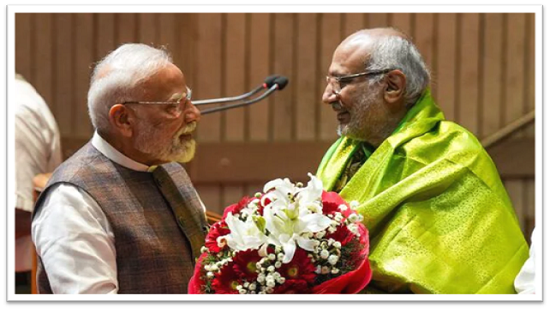
India’s New Vice President with Strong Tamil Nadu Roots: Honourable CP Radhakrishnan Becomes 15th Vice President of India
India has elected a new Vice President, Honourable Chandrapuram Ponnusamy Radhakrishnan securing the post as the 15th Vice President of the Republic. Deeply rooted in the Rashtriya Swayamsevak Sangh (RSS) and the Bharatiya Janata Party (BJP), Radhakrishnan becomes the third leader from Tamil Nadu to hold this office. His election marks a significant political moment not only at the national level but also for the BJP’s growing ambitions in southern India.
Radhakrishnan, currently serving as Governor of Maharashtra, defeated Opposition candidate B Sudershan Reddy by a margin of 452 votes to 300. Of the 767 MPs who participated in the election, 752 votes were declared valid while 15 were invalid. The result, while favourable to the ruling National Democratic Alliance (NDA), reflected a narrower margin than in previous Vice-Presidential elections, underlining both cross-voting patterns and emerging dynamics within Parliament.
A Contest Marked by Cross-Voting
The election recorded a voter turnout of 98.2 percent, with 767 out of 788 eligible MPs casting their ballots. The INDIA bloc had anticipated 315 votes for its candidate Reddy, but the final tally fell short, suggesting cross-voting from Opposition benches in favour of Radhakrishnan. Thirteen MPs abstained, including members from the Biju Janata Dal, Bharat Rashtra Samithi, Shiromani Akali Dal, and one Independent.
While the NDA already held a comfortable majority with 425 MPs and additional support from YSR Congress Party, the outcome nevertheless highlighted fissures within the Opposition camp. Radhakrishnan acknowledged this reality in his first remarks after victory, stating that “nationalistic ideology has overwhelmed few Opposition MPs,” and reaffirmed his commitment to serve both government and opposition voices in Parliament.
Narrower Margin Compared to Previous Elections
Although the NDA candidate’s win was decisive, the margin of 152 votes was significantly lower than in 2022, when Jagdeep Dhankhar won with 528 votes against Margaret Alva’s 182. Radhakrishnan’s victory demonstrates that despite the NDA’s parliamentary strength, opposition unity—if sustained—remains capable of shaping close contests.
The election followed the unexpected resignation of Jagdeep Dhankhar on July 21 during the opening day of the Monsoon Session. His departure on health grounds created a political vacuum in the Rajya Sabha’s presiding role, now filled by Radhakrishnan, who will serve as Chairman of the Upper House.
A Political Journey from Tamil Nadu to Delhi
At 68, CP Radhakrishnan brings long political experience to the office. A two-time Lok Sabha MP from Coimbatore during Atal Bihari Vajpayee’s tenure, he is recognized as an untainted leader with deep grassroots connections. Belonging to the Gounder-Kongu Vellalar OBC community in Tamil Nadu, his elevation is also seen as a strategic step by the BJP to consolidate influence in the southern state, where it has struggled to gain ground.
His Tamil identity is expected to bolster the BJP’s campaign narrative as Assembly polls in the state approach next year. Beyond the regional optics, Radhakrishnan is projected as a balanced leader capable of managing the Rajya Sabha’s complex debates and ensuring parliamentary discourse remains constructive.
Opposition Candidate Accepts Outcome
B Sudershan Reddy, a retired Supreme Court judge from Telangana known for landmark rulings on Salwa Judum and black-money investigations, conceded defeat gracefully. At 79, Reddy acknowledged the MPs’ verdict and expressed faith in India’s democratic process. While accepting the result, he emphasized that the “ideological battle continues with ever greater vigour,” thanking Opposition parties for uniting behind his candidacy.
His statement reflected the larger ideological contest shaping Indian politics, where institutions like the Vice Presidency serve not only constitutional functions but also symbolic roles in safeguarding democratic traditions.
National Leaders React
Honourable Prime Minister Narendra Modi congratulated Radhakrishnan, calling him a lifelong servant of society and expressing confidence that he would “strengthen constitutional values and enhance parliamentary discourse.”
Union Home Minister Amit Shah praised his grassroots journey and administrative knowledge, describing him as a custodian of Rajya Sabha’s sanctity.
From the Opposition, Congress President Mallikarjun Kharge extended best wishes while urging the Vice President-elect to uphold parliamentary traditions and provide equal space to Opposition voices. Such cross-party acknowledgments highlighted the constitutional importance of the Vice President’s role as a neutral and unifying figure in India’s democracy.
Looking Ahead
With his election, CP Radhakrishnan steps into one of the most significant constitutional roles in India. As Chairman of the Rajya Sabha, his ability to navigate complex debates, respect diverse viewpoints, and maintain balance will shape the future of parliamentary functioning. His win is also expected to provide momentum to the BJP in Tamil Nadu, adding a regional dimension to a national victory.
While the margin was slimmer than in past elections, the outcome reflects the resilience of India’s democratic institutions and the evolving nature of political alignments. For Radhakrishnan, the real test begins now: presiding over a Rajya Sabha marked by sharp ideological divisions while upholding the dignity and neutrality the office demands.



